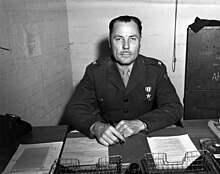Herman H. Hanneken
| Herman Henry Hanneken | |
|---|---|

Brigadier General Herman H. Hanneken, Medal of Honor recipient
|
|
| Born |
June 23, 1893 St. Louis, Missouri |
| Died | August 23, 1986 (aged 93) La Jolla, California |
| Place of burial | Fort Rosecrans National Cemetery, San Diego, California |
| Allegiance |
|
| Service/branch |
|
| Years of service | 1914 - 1948 |
| Rank |
|
| Commands held |
7th Marines 2nd Battalion, 7th Marines |
| Battles/wars |
World War I Banana Wars • Occupation of Haiti • Occupation of Nicaragua World War II • Battle of Guadalcanal • Battle of Peleliu • Operation Cartwheel |
| Awards |
Medal of Honor Navy Cross (2) Silver Star Legion of Merit Bronze Star |
Herman Henry Hanneken (June 23, 1893 – August 23, 1986) was a United States Marine Corps officer and a recipient of the U.S. military's highest decoration, the Medal of Honor.
Beginning his career as an enlisted man, Hanneken served in the Banana Wars of the 1910s and 1920s. During the United States occupation of Haiti, he assassinated the resistance leader Charlemagne Péralte, for which he was awarded the Medal of Honor. Subsequently granted a commission, Hanneken served in Haiti for several more months and was awarded a Navy Cross for killing another rebel leader. He received a second Navy Cross for his actions during the occupation of Nicaragua in the late 1920s.
After a decade of stateside duty, he served in the Pacific Theater of World War II. During this conflict, he was awarded the Silver Star, the Legion of Merit, and the Bronze Star. He retired in 1948, after a thirty-four-year career, and was promoted in retirement to brigadier general.
Herman Henry Hanneken was born on June 23, 1893, in St. Louis, Missouri. He attended the Henrick Preparatory School in that city.
He enlisted in the Marine Corps as a private in July 1914, and served the following five years in the enlisted ranks, rising to the rank of sergeant.
The United States invaded Haiti in 1915 and occupied the country for 19 years. In the years following the initial invasion, rebel forces under Charlemagne Péralte conducted an armed resistance to the occupation. On the night of October 31–November 1, 1919, Hanneken assassinated the resistance leader, Péralte. Hanneken was disguised and led into the rebels camp in Northern Haiti by Jean-Baptiste Conze, one of Péralte's officers who betrayed the Haitian leader. In the short skirmish that ensued, Hanneken killed Péralte and about 1,200 of his followers were killed, captured, or dispersed. Hanneken subsequently circulated a photograph of Péralte's half-naked body tied to a door. However, the attempt to intimidate backfired and instead evoked sympathy for Péralte. Hanneken was awarded the Medal of Honor for "extraordinary heroism" and "conspicuous gallantry and intrepidity in actual conflict with the enemy" and, in December 1919, commissioned as a second lieutenant.
...
Wikipedia
